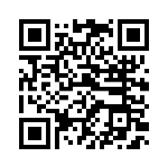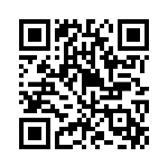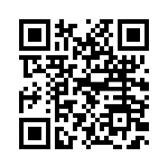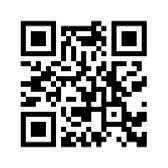Talent Guide



The world of working continues to be fast-moving, constantly evolving, and unpredictable. Every year the Talent Guide survey delivers us one constant and unwavering source of truth – the talent market experiences a shift, year on year.
We levelled up our survey this year with relevant questions informed by current pain points Australians are experiencing in 2023 and projected to experience in 2024. We predicted that economic strains such as rising inflation, continuous interest rate hikes, and talks of a recession would influence what people will prioritise when it comes to their jobs – and we were right.
Before we share those insights with you, we think our story as an employer this past 12 months is one worth sharing.
If we travel back in time to last year’s guide, we learned that people are more purpose-driven than ever before, and that a personalised approach to building retention and supporting talent is key. So we listened and we implemented. A year of transformation took place here at Talentpath where we invested time in new processes, ample resources, new initiatives, and most importantly our people.
Talentpath now have an embedded HR team who have put HR practices, L&D commitment, leadership development, and culture nurturing initiatives as a top priority. We rolled out an intelligent, user-friendly CRM called Bullhorn to revolutionise the way we recruit. In true Talentpath style, this implementation project naturally turned into a partnership where we found new friends and advocates in our account team at Bullhorn.
We revamped and rolled out a brand new website, elevating our digital footprint to truly reflect who we are. It was our mission to make the digital experience for our talent and employer communities both easy and engaging from the beginning of the user journey right to the end. Your path to greatness starts on the Talentpath website – we highly recommend you explore it for yourself.
Everything we do is underpinned by our ability to change lives, and this year we experienced more heart-bursting, life-changing moments than we could count in our Tailored Recruitment Solutions projects. Our team had the most impactful time in Victoria, touching the lives of thousands of people across the disability and aged care sectors whilst helping people from disadvantaged cohorts secure fulfilling, secure careers. To find out what they did and how they did it, skip ahead to pages 40-41.
Enough about us, back to this year’s Guide.
Do yourself a favour and bookmark the featured spread on Wellbeing and Wellness. Yes, we know the word ‘wellness’ has flooded our social media feeds in the past few years, but it is more important than ever to dig deeper into what it really means for you and your employees.
This is a priority and passion for us as we work to support our communities by encouraging better, impactful health and wellbeing practices this coming year. Spoiler: It means more than just free yoga and gym memberships!
You’ll also hear our 23/24 respondents tell us they favour salary, job stability, and flexible working, with all generations ranking salary as their number 1 factor that would attract them to a new role. It’s also no surprise that 61% of respondents told us they’ve taken action in the last 12 months due to the rising cost of living, with many Australians feeling the pinch as the cost of living continues to rise. On the flip side, respondents have also said they are less likely to budge from their current roles in comparison to last year. So what should hiring managers and organisations be doing to retain and attract talent?
It’s time to start looking at what you can do within your culture, well-being initiatives, career progression models, and rewards and recognition offerings to keep your existing talent motivated and happy whilst passively attracting new talent.
We want to extend the biggest thank you to all our featured talent this year for sharing your personal career stories. After reading each one, we noticed a key theme among all the talent stories shared.
It can take just one job to truly change the course of someone’s life.
Every time we connect talent with a role and organisation that perfectly align, we do a little happy dance. For us, recruitment always comes down to the people and the lives we continue to impact through incredible opportunities, and that is why we’ve stayed true to the purpose of the Talent Guide. Yes, the insights are certainly valuable to analyse and apply to workplace practices, but it’s the stories that expose the sheer impact a new job or organisation has on a person’s life and career.
On that note, we think it’s time you get stuck into the 23/24 Talent Guide! Be ready to be influenced, intrigued, and inspired.
Jody Fazldeen and Dionne Sharp, Directors at Talentpath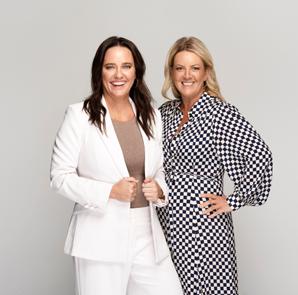
44%
22% are currently job hunting
of respondents expect to change jobs within the next year
Marketing & Digital talent are the highest of all divisions currently job hunting.
This number has decreased from last year.
It was 52% last year, with 30% job hunting.
HR & Talent Acquisition and Business Services talent are least expected to change roles.
A third of respondents say that additional annual leave is more important than salary.
8%
say nothing is more important than salary.
The top 3 benefits that respondents say are more important than salary:
84% 28%
of respondents agree they feel included, respected and safe to be their authentic self in their workplace.
86%
85% of respondents that weren’t born in Australia agree.
of respondents say health and wellbeing initiatives are more important than salary.
of respondents agree their workplace is inclusive and respectful of people from different cultures, backgrounds and abilities.
82% of respondents that identify as Aboriginal or Torres Straight Islander agree.
16% of respondents say that paid parental leave (in addition to the government scheme) is more important than salary
18% 85%
of respondents left their last role due to their direct manager/s. of respondents know what their organisation's values are.
*Flexible hours ranked the highest across all genders and all generations.
The most common top 3 factors that would attract respondents to a new role:
41%
of respondents are undertaking study to further develop their skills and expand career opportunities
*Across all demographic’s salary is on top for number 1 attraction to a new role.
23% of respondents say on-site parking is more important than salary.
of respondents have considered moving into a new career profession in the last 12 months
“Why are you considering changing professions?”
“I feel like I’ve been burned out by my industry. I enjoy the work, but am exhausted by the culture.”
Lead Analyst“I’d like to challenge myself and see what’s out there. I have nothing to lose yet everything to gain.”
Partnership Manager“Looking to change my career to contribute to combating climate change.”
Business Specialist“Better work life balance, better remuneration.”
Portfolio Manager
“Feel the need to diversify my professional experience and skillset.”
Executive Assistant
20% of men said verbal one-on-one recognition was the number one way they like to be rewarded for their work.
Top three ways respondents say they would like to be rewarded for their work
“Would like to upskill and make myself future job safe.”
Talent Acquisition PartnerRespondents are almost three times as likely to prefer one on one verbal recognition over recognition in front of peers.
3
2 1 Promotion or career progression Bonus or financial reward Salary raise 38% 52% 64%
Most common top 3 factors that would attract respondents to a new organisation:
Men: Women:
Culture
Brand reputation
Purpose & vision
Culture Employee benefits Stability
20% of respondents left their last role due to their mental health.
Women are more likely to look for a new role with a higher salary, whereas men are more likely to ask their current employer for an increase
Most common ways organisations are fostering company culture:
1.
Team building activities
Awards & recognition
Ongoing learning & development
“Be transparent about salary, show commitment to mental health through actionable initiatives.”
Learning & Development Specialist
“Employers need to start by putting themselves in the shoes of the employees during this current cost of living crisis and acknowledge that times are hard and people are burnt-out. Ensuring a potential employee knows that they will be looked after is essential.”
Project Manager
“Communicate honestly and often throughout the process.”
Administrator
“Be honest about the role. Clear KPIs and explain the company strategy and how the strategy aligns with the role and how they contribute.”
HR Director
8% say their organisation doesn't do anything to foster a positive culture
61% of respondents have taken action due to the rising cost of living in the past 12 months
29% Look for a new role with a higher salary
15% Ask their current employer for a salary increase
17% Both
“What could employers do to improve their recruitment processes?”
Gen Y are most likely to initiate a salary negotiation
Gen Z are most likely to withdraw an application based on the interview process
75% of respondents would engage with a recruiter when considering their next career move.
16% 91%
of respondents say technology such as a laptop or mobile phone is more important than salary.
of respondents say they know how their work contributes to their organisation's success.
Top 3 factors that respondents say have the most impact on a healthy company culture:
1 Team building activities
2 Ongoing learning & development
3 Health & wellbeing initiatives (including mental health)
Baby Boomers
Health & wellbeing initiatives
Gen X
Regular communication from executives and management
Gen Y & Gen Z
Team building activities
Top 3 reasons respondents left their previous role:
1 Salary
2 Feeling unfulfilled
3 Lack of career progression
Top 3 most common ways HR & Talent Acquisition talent like to be rewarded for their work:
59%
46% 48% Salary raise Promotion Bonus or financial reward
Excited at the thought of matching great people with incredible opportunities, your HR & Talent Acquisition talent have a remarkable ability to strike up conversations, empathise with people and nurture relationships with ease. They are your organisations cultivators of culture and the people you turn to for conflict resolution and difficult conversations. Often experiencing burnout, HR & Talent Acquisition talent need ample wellbeing support, a great workplace culture and a competitive salary package to help them thrive.
40% of HR & Talent Acquisiton talent expect to change jobs within the next 12 months, with 22% currently job hunting.
HR & Talent Acquisition is the only division that put a hybrid working model above flexible hours as their ideal working model.
After experiencing any of these, 56% of women stated that the employer support they received met or exceeded their expectations compared to only 27% of men.
20%
*HR & Talent Acquisition talent are most likely of all divisions to experience both Burnout and Fatigue.
of HR & Talent Acquisition talent say that verbal one-on-one recognition is the number one way they like to be rewarded for their work.
The top three factors that HR & Talent Acquisition talent think have the most impact on fostering a healthy company culture:
Team building activities
Regular communication and visibility from executives and management
Ongoing learning and development
HR & Talent Acquisition talent are happy in their careers, with only 26% considering changing career professions.
81% of HR & Talent Acquisition talent say they would engage a recruiter when considering their next career move.
Top three factors that would attract HR & Talent Acquisition talent to a new role:
Top three factors that would attract HR & Talent Acquisition talent to a new organisation:
Most common reasons that HR & Talent Acquisition talent left their last role:
"In the last 12 months, have you experienced any of the below that impacted your ability to perform your best in your role?"
Top three benefits that HR & Talent Acquisition respondents say are more important than salary:
Fresh out of school with the freedom to do whatever I wanted, I decided to defer my plans to study and instead focus on earning money and travelling. I was compelled by the sense of independence.
To build up my savings I started working at Betts, a retail footwear company and made my way into leadership positions. After a couple of years, it was time for my next chapter. That’s when my career started at The Just Group and where my first role as an Assistant Store Manager for their Jay Jays brand begun. That initial move to Jay Jays was the beginning of the next 10 years of my career at The Just Group. I worked really hard to make my way up through the company, moving from Assistant Store Manager to Store Manager which exposed me to the processes of recruitment, induction, compliance, training and development of internal and external staff – an aspect of the role I became heavily involved in for the brand and a reputation I built within the business which I was known for.
I always knew I had a passion for policies and procedures, leading and developing teams, performance management, and recruitment, so I put my hand up to help whenever the opportunity came up. Working in retail was great, but it really did feel like a part of me wasn’t being fulfilled and although I had exposure to the people function of the business in the Store Manager role, I knew I still wanted to explore a career in HR to really understand the generalist areas of HR and management. I knew at that point that I needed to study to propel my career forward.
I found a college where I could study for a double diploma in Human Resources and HR Management and juggled study with work for a couple of years. As disruptive and life-changing as COVID was, it coincided with a year of my study and gave me the time and space to fast-track my degree.
My goal after finishing my studies was to work in the support office at The Just Group, so I ensured I made key relationships with leaders such as the CEO and General Manager of Retail whilst I was studying and working. Networking and cultivating relationships helped build my credibility and reputation within the business, and within a month of finishing my study a position became available in the HR Department. My first official HR role was a People Support Advisor for Western Australia and South Australia. It was a generalist role, so I was responsible for recruitment, ER, training and development and performance management.
I continued to learn and develop my generalist HR skills in this role for a couple of years before realising there wasn’t any more room to grow. After 10 years at the same organisation, I wanted to expand my experiences and apply my knowledge at an employer ready to invest in their HR team. I came across the role I’m in now
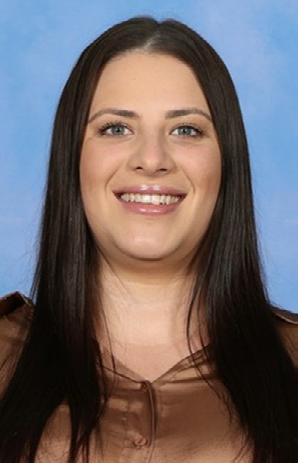
on SEEK and got in touch with Talentpath to learn more. It’s been quite the journey! I knew retail like the back of my hand, so to then pivot into a completely different industry like education was challenging – but I’m loving it.
tomakeahugelifechange.”
How does Carey Grammar support your work/life balance?
Honestly, Carey Grammar has been phenomenal. When I moved from a corporate to school environment, I noticed such a difference in the workplace culture – it’s quite a nurturing/ positive place. I value the flexibility that Carey Grammar allow me to have which in turns gives me a better sense of work life balance. I feel valued as an individual and have a sense of belonging at Carey Grammar.
What piece of advice would you pass on to someone wanting to pursue a career in HR?
If you’re thinking about studying and you want to work in HR, I definitely recommend it. In addition to studying, I think try to get as much exposure as you can to any recruitment and training processes in your current workplace or role. Working hard, understanding what my passions were, networking relationships and taking on new challenges is what landed me my first HR role, so don’t be afraid to show you’re keen to progress your career in HR even if that isn’t where you work now, only you can get yourself there! I also encourage people to take a leap of faith, its important to put yourself first and follow your dreams!
“Ittakesconfidenceandgutstoback yourselfZoe McHaffie Manager
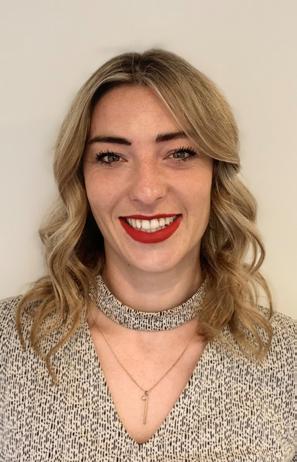 RACQ
RACQ
Take us back to the beginning. How did you start your career?
As a flight attendant for Air New Zealand! I was quickly promoted to In-flight Service Manager, responsible for leading the onboard team. We travelled to various locations in Australia, alongside a number of tropical island destinations. As I embraced my leadership role, I found myself naturally drawn to the talent process. Attending open days and information sessions sparked a genuine passion. I soon discovered that I enjoyed the process of finding and selecting the right individuals to join our teams more than being a flight attendant. It was in those moments that I realised my true calling lay within empowering others and creating supportive teams where everyone would thrive.
a different approach to address effectively. Through adaptive leadership and continuous learning, I was able to navigate these hurdles to cultivate a strong workforce.
Another one that’s come up a few times throughout my career would be overall resistance to change. This could be around introducing new processes, tools, or a new idea to access a new talent pool. People need to understand the why and some people take longer to come around to new innovations than others. However, resilience is key. People have their own motivations and choices, and it is helpful to anticipate potential setbacks and have at least one or two contingency plans incase needed.
Ultimately, people are unpredictable, but this is what makes my position both exciting and challenging. I consistently emphasise a motto at work of “We do like a challenge” to ensure myself and my team are always growing and developing our expertise.
From there, I made a decision to pursue a career in Talent. I then transitioned into a role within a recruitment agency, firstly in Wellington, later gaining experience in both in-house and agency in London. My time in London was truly remarkable, I joined DAZN - a venture capital backed sports streaming business. The magnitude of resources and opportunities surrounding DAZN was incredible. DAZN would bid for sporting rights and, when successful, show those particular games or matches on DAZNs live streaming platform. DAZN was similar to Netflix but exclusively for sport. From a people perspective, winning sporting rights for countries like Portugal or Spain required setting up a brandnew office there, and we were responsible for making it happen from a talent acquisition standpoint. This exposed me to diverse employment and hiring legislations across different countries including Spain, Portugal, France and the United States.
When it was time to leave the UK, I found a great employer who cared about making a difference to the life of Queenslanders –RACQ. I am now leading a team of talent acquisition partners who provide expert talent advice across our banking, insurance, and roadside assistance business lines. Our team strive to facilitate the attraction and successful onboarding of great talent. Overall, my core passion lies in creating a supportive and inclusive environment where individuals feel empowered to contribute their best work. By continuously learning and refining our talent skills, we can better serve as the bridge that connects the unique potential of individuals with our organisation’s needs - fostering a culture of growth and engagement.
I have faced lack of suitable talent issues, fierce competition for top-tier talent, balancing workload of my team and managing teams on a hybrid working model. Each of these hurdles required
The ability to empathise and put myself in other people’s shoes. Many leaders tend to jump straight into problem-solving when faced with an issue. However, I find what people truly need is someone who will listen. Sometimes, people don’t require immediate solutions; they simply want to be heard. Building relationships becomes easier when you have empathy and genuine understanding on where others are coming from.
Also, continuous learning and genuine curiosity has proven to be essential throughout my career. As our business landscape is constantly evolving, with new technologies, market trends, and emerging stakeholder and member requirements. I’ve found continuous learning has hugely assisted in staying up to date with changes and adapting our talent strategies accordingly.
"Thesatisfactionofconnectingwithothers, understandingtheirstrengths,andbuilding acohesiveteambecamemytrueareaof interest."
When living and working in pubs in the UK I was always the people problem solver for our landlord. If there was a people related issue within our team or with a customer, or an event or roster that needed sorting it was sent my way. When you have a large diverse group of people from all over the world living and working together in a busy London pub, it takes a bit of conflict resolution and problem-solving to make it all work.
When I came back to Australia I studied at university and undertook a few courses in HR and IR Management as part of my Bachelor of Business. With a fresh interest on all-things HR, I landed myself a part-time job as an HR Administrator at Brisbane International Airport. It was a workforce managementheavy role where I’d be rostering 200+ employees to match different language skills with flight schedules to maximise our sales opportunities. It was a great first experience in the world of HR and set me up to complete some contracting work before joining Woolworths Group, which I consider a pivotal move in my career. I was with Woolworths Group for nine years and had the opportunity to work across a number of roles for different brands within the Woolworths Group portfolio. A few highlights include working as a Regional HR Manager for BWS and Big W and having the opportunity to complete a national relief in Sydney on a fly-in/fly-out basis whilst balancing a young family at home.
From there, I then moved into an Advisory Manager role within Woolworths Group, working as part of the team that established the national people advisory service in Brisbane. Having the opportunity to work on a formative project that was spearheading HR transformation for such a large, complex company was a career defining experience and gave me an appetite to explore what else could be possible in my HR journey.
Following from my time with Woolworths and looking to gain experience across different industries, I moved into healthcare for 12 months prior to being offered the opportunity to join Eagers Automotive almost 6 years ago. Eagers Automotive is a fast paced and dynamic business with over 7,500 team members across Australia and New Zealand. As the Executive General Manager – People & Safety I am fortunate to lead an amazing team who support all aspects of the employee experience from HR, Payroll and Workplace Health, Safety & Environment through to HR projects and business operations.
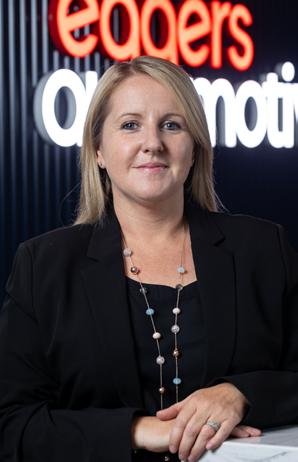
What learned skills have served you well in your industry?
As you progress in your career the more you need to be able to step outside of your comfort zone. Many of the projects (and the challenges that come with them) have been new, so I’ve had to
get comfortable with not having all the answers and have learnt to lean in, asking the important questions and getting the right people in the room. Within the automotive industry, an important skill has been the ability to be flexible and agile to change, our business moves quickly so being able to stay focussed on the end goal whilst adjusting to a changing environment is important.
The best advice I ever received as a HR professional was to diversify my industry experience and take any opportunity that comes your way (especially if both excites and slightly scares you!). I was given that advice 10 years ago and still stand by it to this day. It was the reason I elected to join the team setting up the national shared services within Woolworths Group and had the courage to step in the automotive industry. Without that advice I wouldn’t have had the opportunity to work on some of the projects I have or with some of the amazing leaders I have met throughout the past 10 years. Having diverse experiences gives you inner confidence that your expertise transcends beyond the industry you work in.
“Havingdiverseexperiencesgivesyouinner confidencethatyourexpertisetranscends beyondtheindustryyouworkin.”
70%
39%
48% Salary raise Paid time off Bonus or financial reward
From data administrators to executive assistants, it is without a doubt that Business Services talent make the world go round. Their ability to think five steps ahead, manage time effectively, connect with people from all walks of life and solve problems on the spot is what makes them the backbone of so many organisations. Provide clear opportunities for career progression, security in their position and the space they need to refresh and reboot after busy periods and they’ll be by your side for the long haul.
41% of Business Services talent expect to change jobs in the next year, with 22% currently job hunting.
36% of Business Services talent have considered moving into a new career profession in the last 12 months.
Gen Y are most likely to be considering a move.
This has decreased from last year (55% expecting to change, 32% currently hunting)
20% of Business Services talent say that onsite parking is more important than salary.
31% of Business Services talent have looked for a new role with a higher salary as a result of the rising cost of living.
42% of Business Services talent have undertaken study in the last 12 months to further develop their skills and career.
63% of Gen Z have initiated a salary negotiation in the last 12 months.
Of those that experienced any of the above: 30% of Business Service talent strongly agree they feel included, respected and safe to be their authentic self in their workplace.
48% 42%
did not receive employer support were happy with the level of employer support
"In the last 12 months, have you experienced any of the below that impacted your ability to perform your best in your role?"
Top four benefits that Business Services respondents say are more important than salary:
I graduated from university with an Engineering degree, not sure what I wanted to do with my career. I ended up finding a role with Vodafone at their call centre in Hobart. As time progressed, I not only would answer the phones but take on little side projects to further my skill set. The opportunity to transfer to the Vodafone office in Brisbane came up, and I took it. Brisbane’s warmer, bigger and I always wanted to come up here. Vodafone in Brisbane was another step in the right direction. Still a bit of customer service, but far more freedom to implement change. I had the opportunity to move into a new company within the Vodafone umbrella, and this would be a role where I’d learn a whole new software system from scratch. It gave me the ability to present improvements and suggestions on how to make the system more effective. It was a fixed contract role, so after about five months of improving this software system and finishing the project, I got in touch with Talentpath to see what other opportunities were out there for me.
I ended up starting in a temporary position with Wilson Security in an Accounts Payable role. At the same time, Wilson Security advertised for an administrative and analytics role in their patrols business. I took the opportunity to apply and landed the role full-time. I was there for about a year before the role position description changed based on the needs of the business. It would have replaced the analytical work with mostly compliance-based duties, which I knew I wouldn’t enjoy and take me further away from the career path I was wanting. So, I finished up and got in touch with Talentpath to find my next adventure, which brings me to my current role at Executive Performance Partners as a Business Administrator. I am involved with reporting, analytics, process improvement, and more.
Have there been any challenges or hurdles would you say to get you where you are now?
Something I’ve had to overcome is the ability to demonstrate that I have the skills and that I’ve delivered successes without having the formal titles to back it up. For example, whilst at Vodafone my formal title was Customer Care Agent, but I was heavily involved in building improvement solutions that would be more alike to the responsibilities of a higher-level role. For me, the solution to this has been temporary assignments.
What skills do you think have served you well in your career path?
My time at Executive Performance Partners has helped me to describe my areas of strength and two of these are commercial acumen and evaluation. I can see multiple steps ahead at what the overall benefit of something will be before it is implemented, as well as the layers beneath the surface of a problem - where the root causes and key takeaways are usually found.
Any piece of career advice you’d like to share?
I really enjoy temporary assignments and think it’s a beneficial way for both you as an employee and the employer to road-test what it will be like working together. Often you won’t know how a full-time role is really going to be until you start, so temporary assignments allow you that breathing room to experience something you’re interested in before committing long-term.
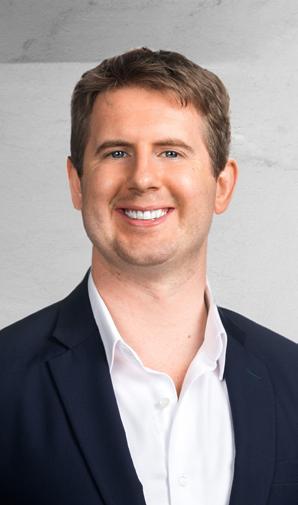
“I’velovedcomingintoorganisationsand beingabletoapplythoseanalyticaland processimprovementskillstohavehigh impactinshortperiodsoftime.”
In my early twenties I worked my way up at Australian retailer Just Jeans, starting my career as a Sales Assistant, then Second in Charge, to then Group Manager of Brisbane’s Southside. We experienced the computer and internet boom at the same time, so I started to show an interest in learning those skills. I thought after 10+ years in retail, I was ready to make a career change. I undertook an Administration course at Sarina Russo. I was two weeks into the course and got chatting with the teacher about how I really wanted to become a receptionist. They fast-tracked me through the course and offered me a Receptionist role at Sarina Russo, which was fantastic. I was there to support the main receptionist, but shortly after starting that role became vacant. They offered me the position of Main Receptionist and I remained there for three and a half years.

After my time at Sarina Russo, I ventured into hospitality for a while managing a couple of restaurants. I ended up becoming an event coordinator for a restaurant and a wedding coordinator for a couple of years. If you’ve ever worked in events, you know the hours are long and there isn’t much downtime. I decided to go back to admin and realised it was the career that best suited me. I loved the people side of being a receptionist, but I wanted to get more value out of my role so decided to investigate becoming a Personal Assistant (PA). I landed my first PA role working for Schlumberger, where I ended up being the PA for two managers whilst running reception and facility management.
My partner then had an opportunity to work overseas, so we made the move to London where I found an Executive Assistant role at a pharmaceutical company, working for the Marketing Manager – Europe Region. The office was based in London, but I had to coordinate with Europe, America, South America and Australia. It kept me very busy and I worked there for about 18 months until my partner’s company sent him back to Australia. After we came back I took this opportunity to work out what I really valued in the workplace and my career. I had a few different experiences, working for a property company as an EA, then for Deloitte for three years. I liked it there, but Talentpath contacted me to understand more about my future career goals. The rest is history.
Now I’m a Business Administrator at Arup, an architectural engineering firm. They collaborate with our clients and partners using imagination technology and they’ve got the rigor to shape a better world. It’s everything that I’ve always wanted to be a part of. I’m responsible for five regional business leaders in a portfolio that consists of property, science, industry and technology, arts and culture, education, and healthcare. I’m the eyes and ears for all five business leaders - It’s never a dull moment.
Finding the right culture is the main thing. It can be a great job, but if the culture isn’t right you’re not going to enjoy it. The most wonderful thing about Arup is that it has an extremely flexible culture. They give you the trust to get the job done in the hours that suit you. Another one, but when you’re in an administrative role it’s sometimes difficult for some managers and bosses to not see you as an adult and someone that is equally worthy of respect. You have to find the right people in this modern world that treat you with respect and see you as an equal.
If you can empathise with every person that you are working with, you skip the misunderstandings and you get straight onto how things can be resolved. You have to be a quick thinker and incredibly resourceful.
“I’vealwayslikedhelpingpeopleandIlike gettingthejobdone.Idon’tneedtobethe leader,butIliketobethepersonbehindthe leadermakingthemgreat.”
I’m originally from Brazil and moved to Australia 10 years ago. In Brazil, I started in an administrative role, supporting head designers to graphic designers for fashion labels and later to my own studio in the fashion industry. I loved the creative side of working in fashion, but to further progress I needed to be fluent in English - that’s when I moved overseas. When I moved to Australia, it was harder than I thought to start in fashion, my bachelor’s degree didn’t transfer here and at the time I couldn’t afford to go back to university. So I took those administrative skills and found an opportunity to grow my career in that direction. I landed my first administrative role in Australia at a global bank supporting the Treasury and Trade Solution’s department. It was great – they needed a lot of support and I could make an impact across the whole department. I had a mentor and taught me so much of what I know today, including learning how to leave a lasting footprint in an organisation well beyond my tenure. It was really encouraging to have someone want to see me grow early on in my career.
I moved into another global banking organisation after this position to learn and expand my skill set. Support roles vary from organisation to organisation, and in this new role, I had exposure to a lot of executives and different projects. There were different niches within my role, which was a great learning experience. I would go from creating presentations to managing people to project management depending on what was a priority at the time. After spending time honing my skills in this role, I was ready to apply my learnings in my next adventure elsewhere. It was when I was putting in my notice that my bosses offered me a higher role working at C-Suite level – they didn’t want me to leave. I had a great network at this organisation, and I had proven my ability to excel in the role, so it made sense for me to progress this way. It was my first time working at C-Suite level and I’m so glad I took the leap. I’m people-driven and thrive on collaboration, so this career path is one that I find deep fulfillment in.
I think people see an Executive Assistant as someone to run and get you a coffee, but it’s not like that. Yes, there’s a lot of email management and people management and the job varies a lot depending on the executive. But for me, it’s all about partnership and giving them the best platform to make critical decisions. It’s about creating boundaries for them and advocating for the things they need to perform their best.
Advice you want to pass on to budding Executive Assistants?
Observe and listen because if you look around, you learn a lot. It’s a skill that’s really appreciated when you know how to use it wisely. Another couple mottos I live by is do your best every day and if you don’t try, you never know how things will turn out. I’ve always been ambitious and wanted to grow; not to climb the ladder as such but to have a real motivator and reason to jump out of bed every morning and give my all. We can’t expect to be perfect 24/7, but I think aiming high helps you become the best version of yourself.
Fast forward to 2023 and I joined Brighter Super in March this year as an Executive Assistant, supporting the Chief Finance Officer and Risk Officer. They are a fantastic team to work with and it’s a very exciting time in the business.
Brighter Super is very supportive of work-life balance, and as I’m juggling full-time work with motherhood it was really refreshing to feel supported in both my career and personal life. I’m able to feel fulfilled in my career whilst being there for my family; it’s really rewarding.

“Ifyouaregoingtodosomething,doitwith care,passionandgiveyourbesteveryday.”
We sat down with Clinical Nutritionist, In-House Recruiter and Wellness Specialist, Sonia Savage.
Sonia, tell us a little bit about what you do.
I’m a clinical nutritionist, but in my past life I was a high-performing recruiter and owned a boutique recruitment company for 10 years.
I studied to obtain a Bachelor of Health Science in Complementary Medicine and an Advanced Diploma in Nutritional Medicine to pursue a career where I could change lives through nutrition and health. I’ve been practicing in clinic now for 6+ years. As a clinical nutritionist, I specialise in helping people with autoimmune diseases, hormone function, fertility, mood and gut health. It’s a very rewarding career knowing you have enabled people to feel better, do more and improve their quality of life.
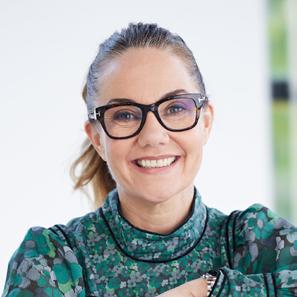
I’m also Talentpath’s Wellness Specialist and In-House Recruiter!
It’s the perfect combination of two careers I’m passionate about. Having more than 17 years experience in recruitment means I have a hands-on understanding of what it takes to be a highperformer in a competitive corporate environment. Coupled with my knowledge around nutrition and wellbeing, I have a wellrounded understanding of what businesses need to empower their teams with practical Wellness Solutions and how to help people feel their best whilst they’re doing their best.
The most common ways employers provided support included:
EAP
Flexible hours
Communication, listening and regular catch ups
Mental health programs
Reduction
As a Clinical Nutritionist and having had a corporate career yourself, what are some workplace wellness trends that you think employers can look out for in the next year?
65% of respondents say their organisation has an accessible and clearly defined wellness program.
Wellness is a really broad term and it means something different to everyone. This year I’m seeing an increase in anxiety with my clients, and interestingly more than 40% of survey respondents said they experienced anxiety in the last 12 months, so there is real evidence there to suggest that workplaces need to focus on practical ways to help their employees manage stress.
From my observations, over the next couple of years organisations need to focus on company culture, inclusiveness, and a sense of common goals among their employees. It’s scientifically shown that community and commonality between people reduces stress. Furthermore, the people who live the longest are those who have a community with a common goal. If your team are united in their goals and have a strong sense of community at work, their mood, anxiety and wellbeing are going to be positively impacted.
Before investigating new wellness programs for your staff, you need to look at how you communicate in the workplace. Your employees need to feel safe talking about how they are coping, and that comes back to psychological safety. Often large organisations have HR teams with designated wellness officers to assist with that, but if you’re in a small organisation you can nominate someone in your office who anyone can turn to when they need a confidential chat.
Another thing often overlooked in the workplace are quite simple human necessities. Are your team moving enough during the day or are they sitting for 8 hours straight? Do they get out in the sun at lunchtime? Evidence suggests that if you don’t get up and move or stretch for a few minutes every 50 minutes, you’re negatively affecting your metabolic rate, blood pressure and cholesterol so it’s literally the little things throughout the day that make all the difference.
As a starting point, I suggest building foundations around open communication, psychological safety and basic movement and hydration. If your culture isn’t conducive to those things, you may need to evaluate how you can make some changes.
“In the last 12 months, have you experienced any of the below that impacted your ability to perform your best in your role?’
of Gen Z experienced anxiety
53% 29%
of Gen X experienced anxiety
*More women than men experienced the above.
Of those that experienced one of these conditions, 45% said their employer did not provide any support. However, 13% said that the support provided exceeded their expectations.
How do you help organisations improve their wellness offering?
As Talentpath’s Wellness Specialist, my job is to ensure that everyone is feeling their best both personally and professionally. My approach is centered around the four pillars of feeling good (managing stress, nutrition, sleep, and movement) and my educational workshops provide clarity around what an individual might be doing well and where they need to improve when it comes to their wellbeing. To feel good at work you need to feel good at home, so I really focus on wellbeing as a holistic concept that can be worked on to improve individuals’ health personally rather than exclusively in the context of work. This in turn leads to top performing talent in the workplace.
If this intrigues you, Talentpath offers this service to their clients as a value add or standalone program for workplaces looking for a holistic solution to their wellbeing offering. We have some exciting long-term plans to support our clients and our temporary talent community, so stay tuned.
Follow Sonia: @balanced_life_nutrition
Top 3 most common ways Customer Experience talent like to be rewarded for their work:
72%
43%
47% Culture Stability Employee benefits
Empathic, patient and adaptable, our Customer Experience talent can turn strangers into loyal customers in mere minutes. They are your frontline brand ambassadors and the first person to call on when your customers need support. Ensure you’re offering a competitive salary and bonus structure, wellbeing support and team building activities to keep your Customer Experience talent loyal and engaged.
77% of Customer Experience talent would engage with a recruiter when considering their next career move.
42% of Customer Experience talent expect to change jobs in the next year, with 16% currently job hunting.
Whilst 57% of Customer Experience talent have looked for a new role with a higher salary due to the rising cost of living, only 24% have asked their current employer for a salary increase.
Top three factors that Customer Experience talent think have the most impact on fostering a healthy company culture:
Team building activities
Ongoing learning & development
Health & wellbeing initiatives
"In the last 12 months, have you experienced any of the below that impacted your ability to perform your best in your role?"
Of those that experienced of the these:
did not receive employer support were happy with the level of employer support
say the employer support exceeded their expectations
36% of Customer Experience talent have considered moving into a new career profession in the last 12 months.
Top three factors that would attract Customer Experience talent to a new role:
Top three ways Customer Experience talent like to be rewarded for their work:
26% of Customer Experience talent have undertaken study in the last 12 months to further develop their skills and career.
* this is the lowest of all divisions
Top contributing factors for Customer Experience talent leaving their last role:
balance
Top three benefits that Customer Experience respondents say are more important than salary:
The hustle began as soon as I was legally able to work. If I wasn’t at school, I was working! I had a job at an outlet department store at the age of 14, working part-time whilst in high school on the Sunshine Coast. Everything was going well, until my last year of high school when my mother passed away. It was a tough and overwhelming time for me. To add to my stress, my manager at the outlet department store lacked the empathy and understanding I needed whilst going through such a difficult period. I was just 17 years old experiencing what would be one of the hardest moments in my life, and I desperately needed that bare minimum of support from my manager to allow me to grieve. I had an opportunity to become a receptionist at a local hairdresser which wasn’t far from where I lived at the time, so I quickly quit my role at the outlet department store and started working a couple of days a week at the hairdresser whilst studying a diploma of beauty therapy.
I had a lot of fun in this workplace and I love working in beauty, but I wanted more. From here I used my receptionist experience to land a Personal Assistant role at an accounting firm in Woodford and worked there for about a year. At the same time, I fell pregnant with my first son, Caden, and became quite ill to the point that I couldn’t work full-time anymore.
I found a part-time hospitality job that was easier to juggle whilst pregnant and struggling with sickness, then once I had Caden I took a three-year break from working. I had another child in that time as well! I wanted to be there for my babies in those formative years, but towards the end of the third year I started thinking ‘I need to get back into work for my own sanity’.
I was a single mum at the time, so I needed financial stability to support my two children and myself. At the end of the day my kids come first, so working for a company that was going to be flexible and understanding of the fact that I was a single mum was so important.
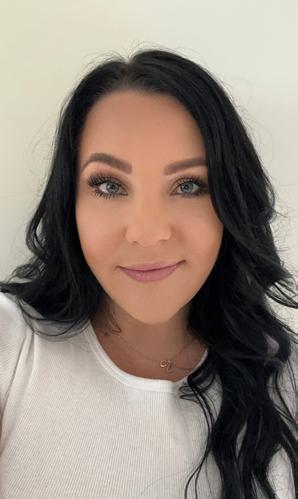
I’ve always had managers who have had children themselves and have been flexible and understanding of what parenthood is like and how unpredictable having children is, so that’s been really nice.
Have you always wanted to pursue a career in Customer Experience?
Before working at RACQ, I saw work as a means to pay bills and nothing more. My main focus in life was being a mum, and to an extent it still is, but my job at RACQ sparked a fire in me. It had me thinking, “Actually, I want to climb the ladder here. I want to have a career and I want to excel.” I wanted to become the manager I needed when I was 17. I wanted to be compassionate and empathetic towards life hiccups whilst leading a team to success, so I began working towards that goal. I started off on the phones, managing claims then moving into a support role assisting a large team whilst taking opportunities to fill in for team leader roles when people were on leave.
What tips can you pass on to those wanting a career in Customer Experience?
What I’ve learned so far in my career is that putting in the work to achieve your goals doesn’t go unnoticed. Doing the work, being knowledgeable in your position, expressing your goals with your direct managers, and having the confidence to back yourself is what helped me progress to where I am today.
I lived on the Sunshine Coast for most of my life, and as much as I love the beaches and laid-back lifestyle, I was ready for a change after having Caden, so I made the move to Brisbane and happened to meet my partner at the same time as well! It was almost like I was meant to move. I found a Claims Consultant role with RACQ through Talentpath and haven’t looked back since. I’ve been lucky throughout my time at RACQ.
“Iwantedtobecompassionateand empathetictowardslifehiccupswhilst leadingateamtosuccess,soIbegan workingtowardsthatgoal.”
I’m currently the Contact Centre Manager at Super Retail Group, which is the proud owner of four iconic retail brands (Supercheap Auto, rebel, BCF, and Macpac). I manage our customer contact centres across Brisbane, Melbourne, and New Zealand, so about 100 team members in total. My journey in customer experience actually started at The Coffee Club many years ago. I’ve always been open to new opportunities, so after dipping my toes in the customer service industry at The Coffee Club I started to look for another role on Brisbane’s southside, where I lived at the time. A job came up at RACQ in their contact centre, so I thought I’d give it a go. Little did I know that this experience would spark my love for the contact centre environment. I became more curious about all the moving parts involved, from how they functioned to how to lead a team. Showing that initiative and drive really helped me fast-track my career at RACQ, where I was quickly promoted to Team Leader. I loved the people aspect of the job and really enjoyed training, coaching, and providing feedback to my team.
I progressed at RACQ into a different branch of the business as a manager for the Night Support Team. It was a varied role in a higher-pressure environment, which was a challenging but rewarding experience. I had shown an aptitude for improving team efficiencies and processes in the Night Support Team and was asked to do the same for the Dispatch team as a Field Support Manager. That was my first real step forward into a fullyfledged management role.
From here Allianz Partners asked me to lead their Roadside Assist business as a Senior Team Leader, with a remit to move into an Operations Manager role. It was a role where I could bring my passion for contact centres to life and transform that aspect of their business. I implemented a few key processes and procedures in this team before moving into the Operations Manager role for an automotive customer care team – then COVID hit. I went from managing one line of the automotive business to four during COVID – it was a crazy time.
A friend who worked at Super Retail Group knew my career background well and they asked if I was interested in running and improving their Customer Care team. I said yes and I’ve now been here for a year and a half, improving and implementing new processes in the Contact Centre to drive some really great results.
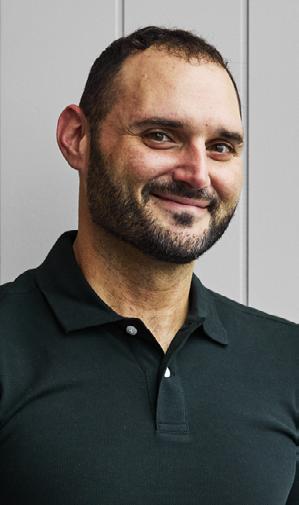
I love working in contact centres. I’ve worked in a few companies now and all of them have a community and family feel unique to the contact centre environment. There is so much you can leverage to improve customer experience as well, and it’s so people-driven.
What is something that would surprise people about your industry?
I think it’s the sheer amount of work that you do in the background that really surprises people. When I was running four lines, I was changing hats every day depending on the priority at the time. Also, the shift in perception around contact centres is so different now. We’re a highly valued intelligence hub for businesses and can provide crucial data on customer insights and experience. It’s a good feeling for the team, knowing how important they are to overall business success.
What is one piece of advice for anyone wanting to enter your profession?
A lot of people expect opportunities to present themselves, but instead, you can show interest and openly talk about your goals with your leaders and next-in-line.
Also, treat job interviews as an experience to understand a role in greater detail. Maybe you won’t score your dream role straight away, but the next time you have an interview opportunity, you’ll be prepared and confident.
"Takeeveryopportunityyoucanandmake sureyou’reonthefrontfootwhenaskingfor opportunities."
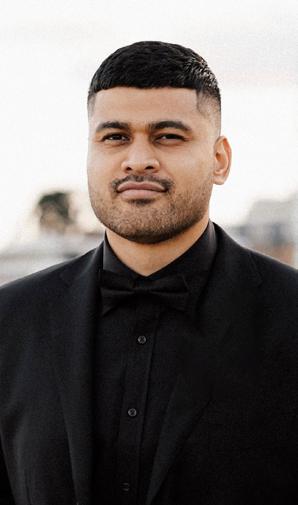
It wasn’t a linear path! If we go right back to the beginning, I actually studied and graduated with a bachelor’s degree in landscape architecture while working part-time as a receptionist at a gym in New Zealand. After finishing my degree, I went on to work in a kitchen, quickly working my way up from Kitchenhand to Prep Chef. Ready to apply my learnings from my study, I then completed 6 months of work experience in the landscape field for a council in New Zealand. Although the experience was fun, an opportunity came up to help my dad with his business where I managed the admin side of things.
I made the move from New Zealand to Australia and started driving trucks for an energy drink company. Surprisingly, this role was classified as an essential service during the pandemic, and I continued to work up until our fourth or fifth wave of COVID-19 in 2021, but by that point, I was ready for a career change. I reached out to Talentpath to see what opportunities were out there and shortly after I started at RACQ in their contact centre insurance team. I had zero insurance background but had an eagerness to learn and do well. Starting in a Claims Management Officer role, I worked my way up into a Claims Assistant role, which then led to an opportunity to lead a team.
My managers recognised my ability to connect with people and I had made a good impression to the point that they saw leadership potential in me. They approached me to take on a management position, and to be perfectly honest I wasn’t sure what I wanted to do. I enjoyed what I was doing. But as soon as I was asked the question, ‘Would you like to lead a team of people?’ – a switch was flicked. I knew I could have more impact on people in my team by being their manager and leading them.
In less than 18 months I had gone from knowing nothing about the industry to then training new starters in a management position. I had incredible mentors from the get-go who provided me with the tools I needed to succeed. It was just up to me to be proactive and push myself to get to that next level, so I took the opportunity and haven’t looked back since.
What hurdles have you faced so far in your career?
The knowledge gap when I started my career in insurance. There were a couple of instances where people who had an insurance background were hired and moved up the ranks faster than I did because they had that background knowledge. It’s a given that would happen, and whilst it was a setback for me, I turned it into a challenge. I pushed myself to see where else I could show value to make myself stand out. Even though it was something I identified as a hurdle, I was still able to move quite quickly to a management role. I made it known to management that I wanted to help people in a leadership position and had incredible
mentors that were truly invested in my growth, so I do think that really fast-tracked my journey and gave me the confidence I needed to do that.
Tips for anyone wanting to move into a management position in the customer experience field?
I swear by the AAA method (in the context of a contact centre environment) – it’s being adaptable, approachable, and available. I believe embodying all those things helped me get to where I am now. Being adaptable by showing the ability to learn new information quickly and take on a new industry such as insurance, having an approachable attitude so my managers knew that I was always looking to progress, and being available for my peers and managers to show I’m there for them at all times.
In the context of leading teams, being available is so important. I show up for my team to show them that they can progress the same way that I did. I wouldn't have been able to work my way up if my managers weren't making time for me, and now I want to do the same for my team.
“Ihadincrediblementorsfromtheget-go whoprovidedmewiththetoolsIneededto succeed,itwasjustuptometobeproactive andpushmyselftogettothatnextlevel.”
Top 3 most common ways Sales talent like to be rewarded for their work:
58%
33%
58% Salary raise Promotion Bonus or financial reward
Sales talent have an incredible ability to influence and persuade even the most stubborn of people to become customers of your product or brand. While they are focused on generating profit for your business, Sales talent are just as driven in forging strong relationships to foster long-term growth. In a high-pressure environment like Sales, talent in this field will appreciate ample wellbeing support and a healthy company culture in addition to a competitive salary and plenty of financial incentives.
47% of Sales talent expect to change roles in the next year, with 26% currently job hunting.
In the past 12 months, the rising cost of living has prompted Sales talent to do the following:
"In the last 12 months, have you experienced any of the below that impacted your ability to perform your best in your role?"
59%
of Sales talent that experienced any of these say they didn't receive any support from their employer.
*This is the highest of all divisions.
37% of Sales talent have undertaken study in the last 12 months to further develop their skills and career.
The top three factors that Sales talent think have the most impact on fostering a healthy company culture:
77%
Top three factors that would attract Sales talent to a new role:
of Sales talent know what their organisation’s values are.
*This
42% of Sales talent have thought about a new career path in the last 12 months.
Top three factors that would attract Sales talent to a new organisation:
Top contributing factors for Sales talent leaving their last role:
Top three benefits that Sales respondents say are more important than salary:
Take us back to the beginning. How did your career start?
I’ve been in sales for 12 years now. Growing up in the Hunter Valley, I started my sales career managing a small team at Mcdonald’s at the age of 21. At the same time, I had a friend that was working for a Tax Appreciation company in Newcastle who were on the hunt for a Business Development Representative. My first thought was ‘What is a Business Development Rep?’. How times have changed! I immediately googled what it was and thought ‘Yeah, I could do that’. My expectations were different from the reality of the role, but it was a great place to start my Business Development career.
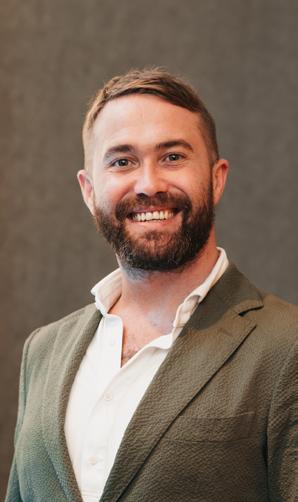
What I love about my job now is that it’s really partnership and relationship driven. Sales can often be very transactional, but being able to forge real connections and long-term partnerships is incredibly fulfilling for me. I feel like I’m providing a solution to help alleviate pressures and pain points in a business, and I’m problem-solving a lot more than I used to.
If I compare how I operated 12 years ago to now, I’m far more strategic in everything I do. I’ve built a personal brand on LinkedIn and people come to me now versus the other way around. It’s more strategic. People can tell when someone is not genuine, especially when it comes to sales so be true to yourself. I can say with confidence that I will not sell something I don’t believe in. Sales is so much more about trust and relationships than ever before, and the most successful people that I’ve seen in sales have been the humblest.
Sales felt like a natural fit for me. I spent a good six years at this company, moving up to a Business Development Lead from Business Development Specialist within a couple of years. That’s when the travel started to ramp up – I was on the road for more than half the year. As much as travelling for work sounds great, the reality was that I couldn’t keep doing it. It was affecting my relationships with my family and friends, and even affecting my ability to find a partner.
I needed a bit more stability in my job. I had an epiphany that I had to move, so I proposed a plan for my company to expand to Sydney and cut my travel hours down by half. The plan worked, and I opened the Sydney office in 2017 spending six months setting up the business.
I’d been a consistent top-biller at this company for a while and realised I had kind of hit a concrete ceiling. Another move had to be made, and I found my next role at a design & construction company as a Client Relationship Manager for Australia and New Zealand. I was here for about 12 months before the business underwent some functional changes that resulted in me being offered a redundancy. Another blessing in disguise, I took this opportunity to give recruiting a go! I was recruiting for about 18 months, and in that time worked on an integration using a software called Bullhorn. Bullhorn saw my potential and came knocking. Before I knew it I was on board, and the rest is history! I’ve been at Bullhorn for two years now. I love the recruitment industry, but I love being on the technology software side of it more.
I’m driven by value alignment in all areas of my life, so who I am and what I stand for are actually really important factors to consider when I look at what I want from my career. Be true to your values, bring your whole self to work and know what you stand for so you can be your best version of yourself every day.
“Thereissomethingaboutgetting somebodyyou’venevermetbeforetolike youwithinthefirsttwotothreeminutesof themeeting.”
I’m the Head of Partnerships at the Australian Computer Society. Our organisation represents IT professionals in the workforce, helping them upskill and stay current in different technologies as well as assisting in developing their industry knowledge and professionalism, making sure that they have the skills that they need to progress in their careers. My role oversees the commercial side of the business. We work with large organisations that want to build an exceptional tech team and see Australian Computer Society membership as a way of building skills and career paths. One side of my role is to facilitate that, ensuring that we have a program of work that enables and engages those companies to achieve their goals. The other side of my role is to build more reciprocal relationships and to develop new products or benefits for our members through commercial arrangements.
My career started in a customer service role a long time ago with the Australian Associated Press. It was never something I thought of as a career, but when I had that first experience in the corporate world, I discovered my strengths and passion for customer engagement and problem-solving. From there, I found my way into the events space working at an event agency for quite a few years. Events involved learning about sales, marketing, and sponsorships – so even though my title was Event Manager, I learned so many valuable, transferrable skills. I worked in events for 10 years, but after the six-year mark I realised it wasn’t the career for me. It’s an incredibly high-stress, high-pressure, and emotionally draining environment that I knew wasn’t good for my health. Often, I’d have to sacrifice my personal life to ensure an event ran smoothly, and that’s when I realised this wasn’t the career path for me. It was hard because I was comfortable being very good at what I did, so it was one of those willpower moments where I had to back myself to make a change.
While I was working out what I didn’t like doing, I realised how much I enjoyed the customer satisfaction aspect of my role. The bit where you make people happy and help them meet their goals was really fulfilling for me. That’s when I started to explore a career in account and sales management. With a commercial background under my belt, I was approached by Australian Computer Society to come in as a Strategic Partnerships Manager (the role below my current position). I’ve been at Australian Computer Society for 5 years now and absolutely love it.
I entered the workforce at the age of 21, not knowing what to do. In retrospect, I was lucky to have entered the workforce in corporate positions that allowed me the ability to understand where my strengths and skills lie. On the flip side, I’ve also worked out what I don’t want to do, which I think is arguably more important than knowing what I do like doing when it comes to my career.
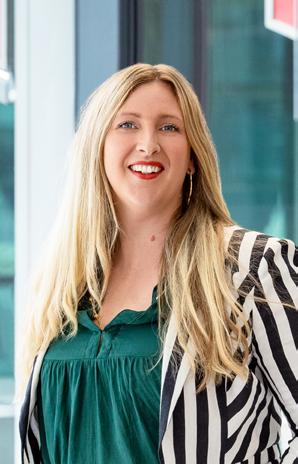
I can’t decide if this is a skillset or a way of being, but dedication to continuous learning. If you’re not constantly thinking about how you can learn more, then you’re always going to be behind the curve. Taking that mindset and applying it to your career but also to all aspects of your life can have a really positive impact. One that I’ve learned later in my career is don’t put off tomorrow what you should do today. I created stressful situations for myself by procrastinating, saying to myself ‘I’ll get back to it’ or ‘I’ll do it later’. Now I just do the things I need to do now to avoid that stressful feeling.
Having confidence and genuine belief that I could do something else with my career was a massive hurdle, and it’s easier said than done. The saying ‘fake it ‘till you make it’ is true in my experience. Oftentimes, if you’ve done something at least once, you’ll most likely have more confidence the next time you do it. It’s always the first time attempting something you haven’t done before that is scary. If it works out – fantastic. If it doesn’t, it’s not a big deal. You’ll learn from every experience, so I recommend working on building that inner confidence as it will help get you where you want to be.
"Ifyou’renotconstantlythinkingabouthow youcanlearnmore,thenyou’realways goingtobebehindthecurve."
Take us back to the beginning of your career, how did it all start?
My career started before it even began! Before I was old enough to be employed, I did a lot of volunteer work with my parents who were both executives in social welfare organisations in WA. When I was 14, I worked with my mum on a project for a large mining company, focussed on building cultural capability in their work environment. I would say it was my first real experience ‘working’ and feel privileged to have had such a meaningful entrance to the workforce! My first sales role was at 16, working in for a large home improvement company. I worked in various roles in education and the public sector and then landed a Director level role in my early 20’s at the University in Darwin. Looking back now, I think “what on earth were they thinking?”, but, as a team, we achieved amazing things together in that program, and really, it was important in forming the direction of my career. The best part of the role was mentoring and coaching the early years educators and getting my first real dive into people development!
If I think about an intentional career path, being honest, I don’t think there was one. I’ve always been pulled towards education and developing people. In my current role, “sales” is just the mechanism to do that; develop people and create better managers and leaders for a better society. My current role is the General Manager of Sales and Client Experience at the Institute of Managers and Leaders – I manage two teams and the end-to-end sales, delivery, and client experience functions. Our organisation is a training and membership business, and we specialise in leadership development. We design programs that result in real behavioural change, particularly for leaders.
Perhaps I’m fortunate to feel as though gender wasn’t a major barrier for me in the early years of my career, in fact, the major challenge I faced was my age. I moved into relatively senior roles at a fairly young age, like a recruitment position at the age of 20. At this point, I was interviewing experienced teachers and realised I had to establish credibility quickly. As a 20-year-old, that was difficult. I’m grateful to have been given the opportunities that I’ve had, and I can say, this challenge really helped me hone my phone manner – I realised early on that I sounded older than I looked and took advantage of as many phone interviews as possible!
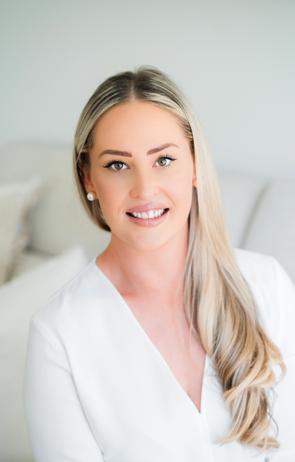
Leadership is a skill that is not just important for those that manage staff. Great leadership has a radiating impact on all those around you, and as we know, 2 out of 5 people leave jobs because of a bad manager, so the impact of bad leadership is obvious! Speaking about sales skills specifically, in our industry, you cannot put a price on a good healthy dose of curiosity and, of course, putting the client and their needs at the centre. It’s not about pushing products; it’s about understanding and co-creating with your clients. This drives you to develop a strong consultative process focussed on the outcomes, not the product you have to sell.
When I came back from maternity leave in January, I hit the ground running and almost forgot about a personal mantra that I’d developed over many years – that the hours you work do not define your value, your outcomes do. I was working so hard that it took a fairly serious event to remind myself of this and, ultimately how important mindfulness and wellbeing are to my success at work, and a generally happy and healthy life.
In that spirit, even if it’s five minutes I try and start everyday with some kind of mindfulness exercise. Sometimes its yoga related, sometimes it’s a walk, sometimes it’s just doing some guided breathing. At the end of the day, I try to do some kind of circuit breaker activity to signal the end of the business day, that really helps to create boundaries from work and helps me be more present in my home life, particularly with my 1-year young daughter.
“Sales is the mechanism that enables us to achieveourvision,todeveloppeopleand createbettermanagersandleadersfora bettersociety.”
78%
48%
55% Salary raise Paid time off Bonus or financial reward
Your marketing and digital talent are the ultimate shapeshifters that can transform from wordsmith, content creator, strategist to data analyser all at the snap of the finger. They are the keepers of your brand and work hard to put your organisation in front of people who need to see it. Reward Marketing & Digital talent with a salary raise, include them in team building activities and allow them the opportunity to work flexible hours to continue marketing momentum in your organisation.
46% of Marketing & Digital talent expect to change jobs in the next year, with 28% currently job hunting.
"In the last 12 months, have you experienced any of the below that impacted your ability to perform your best in your role?"
Marketing & Digital talent are more likely than other divisions to experience anxiety.
In the past 12 months, the rising cost of living has prompted Marketing & Digital talent to do the following:
53% 35%
of Marketing & Digital talent say that flexible hours are their ideal work model.
Whilst 44% of Marketing & Digital talent say their employer didn’t provide any support when experiencing any of these, 48% said the employer support they received met or exceeded their expectations.
of Marketing & Digital talent have considered a new career progression in the last 12 months.
45% of Marketing & Digital talent have undertaken study in the last 12 months to further develop their skills and career.
Top three factors that Marketing & Digital talent think have the most impact on fostering a healthy company culture:
Top three factors that would attract Marketing & Digital talent to
new organisation: Top contributing factors for Marketing & Digital talent leaving their last role: Lack
Top three benefits that Marketing & Digital respondents say are more important than salary:
I look after all things digital marketing for CV Media and Signage for existing projects and new e-commerce ventures that the business is exploring. If we rewind a few years, my career in marketing started as soon as I finished school where I interned at a retail consultancy that specialised in e-commerce. I spent most of the time working on e-commerce websites, launching traditional brick-and-mortar retail locations into the online space, and optimising their marketing processes at the same time. Being an intern, and growing into a full-time position, this was a huge learning experience that really opened my eyes to the capabilities of e-commerce and how big the market truly is. You can sell your product to literally anyone in the world and that was super interesting for me.
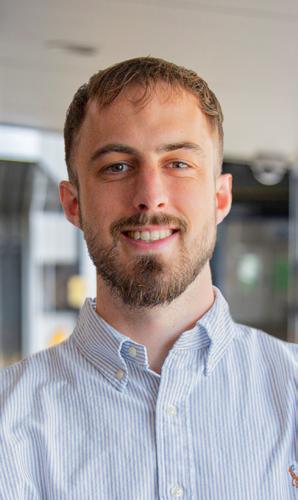
Work-life balance is in their mission statement – They really do prioritise balance and benefits in the office. We have a gym, free breakfast at work, salary sacrifice; there are a lot of perks. In addition to that, they are also very pro-personal development and give you the tools to pursue courses or events to help you grow in your career.
Get comfortable with being your own teacher. It helps to have someone look over your shoulder and point you in the right direction but there are a lot of resources online that you can use. Going to university is good, but honestly, even without university you can learn so much and gain so many skills in digital marketing by being curious and applying yourself to online courses (reputable ones of course!). You can learn so much but the caveat to that is to make sure you apply the learning.
There was a pivotal moment with this company that blew my mind. Keep in mind it was 2015, so this is old news now, but being able to see real-time Google Analytics on our client’s website of where their visitors were located, how long they spent on each page and so on was a ‘wow-moment’. It took all the guesswork out of marketing for me and as a very analytical and data-driven person, I found it fascinating. Being able to hypothesize and test based on data from your website is my kind of fun. After that moment I realised that I wanted to pursue a career in marketing, specifically specialising in e-commerce.
An ongoing challenge for anyone who’s in marketing – especially e-commerce – is keeping up. It can almost be overwhelming at times the amount of innovation that happens in the digital marketing world. You really need to love learning new things to stay up-to-date in marketing.
When I say I work in digital marketing, a lot of people say, ‘what does that entail?’, and really, it can be so many different things. I know there is the saying ‘jack of all trades, master of none’, but I think that having a bit of knowledge on everything and being able to do it relatively well is generally better than having one specific specialisation that you pigeonhole yourself in, particularly in digital marketing, it’s important to know how different systems capabilities and how they can be integrated. If you specialise only in email marketing, that’s all good (if the company needs email marketing) but if they suddenly don’t need it or there are changes to their digital marketing strategy, you’re left without a leg to stand on.
“Beingabletohypothesizeandtestbased ondatafromyourwebsiteismykindoffun.”

Take us back to the beginning. How did your career start?
I’m originally from India and migrated to the UK before settling in Australia. I spent my time in the UK studying for my Bachelor’s Degree in International Business and Communications and then my Master’s Degree in Marketing Communications before moving to Australia in 2005. Growing up, my dad was a very successful senior sales and marketing executive who worked in FMCG, going on to become India’s national Vice President for a global electronics company, while my mum was an established child psychologist. I was already so exposed to the world of sales & marketing, and I like to think I have it in my blood.
Despite having the educational background to set me up for success, I struggled to find a job when I first moved over. I applied for over 100 roles with no luck before reaching out to a recruitment agency to have a quick chat. I came in to interview as a candidate but ended up sparking the interest of the General Manager of the recruitment agency! At this point, I still had no idea what role was on offer, but I took the opportunity to start my career then and there. It turned out to be a Sales Coordinator role, so nothing to do with marketing but still an invaluable experience that was my first break in Australia.
My General Manager nurtured and mentored me which was life-changing. She knew my goals and helped me get to where I wanted to be. Shortly after my stint in sales, I moved into a marketing role with Horticulture Innovation, a grower-owned, notfor-profit research and development corporation for Australia’s horticulture industry, which was pivotal in solidifying my presence in Australia. This experience was invaluable for my career going forward, and really helped me land more senior positions at other organisations later down the track.
My role now is Head of Marketing, Digital, and CX at Circonomy. Circonomy is a registered social enterprise that is on a mission to create a world where nothing goes to waste. Circonomy is passionate about repairing, repurposing, renewing, and rehoming quality goods to keep products and materials in use for longer – reducing waste, and creating a more sustainable future in the process. My role is about developing the brand strategy to raise awareness and develop our digital/e-commerce channels as well as maintain & improve customer experience across all our offline and online touchpoints.
I’ve had the pleasure of working on a variety of campaigns so far in my career, but my proudest achievement would be my impact on the avocado industry as the industry’s marketing manager for almost 6 years. At the time, avocados weren’t hot property like they are now, so it was about pivoting the perception and putting together a market strategy that would drive avocado demand up and increase market share. Even though avocados are fresh produce, I approached them as a brand that needed a marketing strategy. Where the avocado market is now is phenomenal, everyone knows what an avocado is. I implemented the food service strategy for the industry, which is partially why we see so many avocado-based products on menus now.
Moving to Australia, in retrospect I think my name was a barrier to entry in my career. I wasn’t Allen at the time, it was a different and very uncommon last name to Australians. Arriving in a new country, not knowing anyone or having any networks on top of the barriers above was difficult. I’m very lucky to have mentors and to have people who have believed in me along the way as well. It’s like having that ‘wind beneath your wings’ kind of thing. It’s a group of people who propel you to grab that opportunity and make it your own.
“EverythingI’veachievedhasbeenbuilt basedonmyability,resilience,andgrit whichI’mveryproudof.”

Coming from Central Queensland, I finished my degree in two and a half years, fast-tracking it so I could graduate mid-year. It was very intentional – I didn’t want to compete for a graduate job at the end of the year like everyone else. It worked and I secured a graduate role with Jacobs, an international engineering consultancy firm. From day one it was very hands on – I was sent down to the Gold Coast to work on a billion-dollar project in my first week! I started in internal communications, before working my way up into a community engagement role that was quite involved. It was an incredibly valuable learning experience for me in terms of stakeholder engagement.
As the project drew to an end, I was ready for a change. I happened to be driving past the Mater Hospitals while in Brisbane for a trip and saw a poster that they had outside of their building. They were opening a new mothers’ hospital building, and the creative was just beautiful—I loved it.
It felt like fate, because a while later a role in their internal communications team popped up. I got in touch immediately and shortly after joined their department as a Marketing Communications Officer. I was there for two years before taking maternity leave to have my daughter. At the end of that year, I decided to extend my leave to live overseas for a year.
When I came back to my role, it had quite naturally evolved, and I ended up working more on corporate communications, which I absolutely loved. I progressed into a senior position and was working on group-wide projects, strategy and executive communication. After being in that role for a few years, I saw an ad for the Communications Manager at Brisbane Girls Grammar School. The role seemed like a perfect fit for me, so I applied. I even remember a few colleagues at the time mentioning they’d seen the ad and actually thought of me. The School offered me the Communications Manager role, which I held for three years, until the Director role became vacant. I have been in the role of Director of Communications and Engagement for about three years (including a period of Acting).
I lead communications, events and engagement, and projects. What I enjoy most is the diversity of the role and the School’s overall commitment to excellence. The School has a very strong academic reputation, but it is something that as a professional department, we also aim for.
There are so many exciting moments, it’s hard to pick one. But one of the first was when I was at Mater, I won a national award for sustainability marketing. That was my first national award, and a project I was really passionate about.
you faced in your career?
Going on maternity leave was a challenging period in my career. Coming back to a role after having two years away—during which time I’d matured and changed as a person—was tricky at first. It was tough for me to reconcile, thinking about the what ifs. The positive was that everything I’d gained in my two years off I could apply to my job, and as a result, I began to work on quite challenging projects and expand my skills. There are always going to be challenges, and the biggest learning for me has been finding a way to leverage them positively—Will this make me better at my job? What can I learn from it? Of course, that perspective often doesn’t come immediately!
What would surprise people about your role?
That I’m not a teacher but I work at a school. I think with Communications, we do try to function behind the scenes, so not everyone understands exactly what it is we do. I know my father had no idea what my job was about!
What skills have served you well throughout your career?
Stakeholder engagement, for sure. Another one is being responsive, but not reactive. Communications and Events can often be high-pressure environments, so having the ability to be calm, and not reactive is really important.
"Evenwhenyou’rebusy,makingtimeto buildrelationshipstrulypaysoff."
Our Tailored Recruitment Solutions team focuses on building large-scale campaigns that deliver high-quality results with a human-centered approach.
We understand that business needs and culture fit are a top priority for almost all organisations, which is why our purpose led Tailored Recruitment Solutions methodology is designed to find talent with great culture fit as efficiently and accurately as possible. We partner with organisations to become an extension of their team to superpower growth not just in recruitment but in existing people capability as well.
This year, our Tailored Recruitment Solutions service allowed us to support disadvantaged cohorts through life-changing opportunities. Fuelled by our passion for changing lives, our team worked on an incredibly impactful project in partnership with RMIT, Jobs Victoria, and the Workforce Innovation and Development Institute in Victoria, touching the lives of thousands of people across the disability and aged care sectors whilst helping people from disadvantaged cohorts secure fulfilling careers. The team implemented more than 60 recruitment events over the span of 12 months, resulting in more than 490 people being placed into traineeships with guaranteed employment upon completion. The success of the recruitment events is underpinned by our ability to be adaptable and creative throughout the whole process whilst prioritising value and result alignment across all stakeholders involved.
"RMIT partnered with Talentpath in May 2022 when we were looking to recruit new staff from priority groups into the Aged Care and Disability sectors in Victoria. Alli took the time to listen and understand what we wanted to achieve, the values of individuals the industry required and how that could be linked with recruitment strategies. In the end the team designed and delivered 60 successful recruitment events with knowledge, passion and enthusiasm to help us achieve our project outcomes. If you are looking to recruit new staff in volume, I would highly recommend a conversation with the Talentpath team."
Lesley Bridge, Senior Program Manager Workforce Innovation and Development Institute"(The Recruitment Event) is an informal, friendly and warm way of getting to know each other and the company you are interviewing for. I couldn’t rate (the experience) any higher."
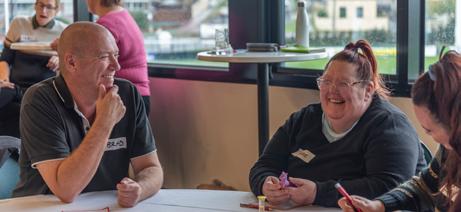
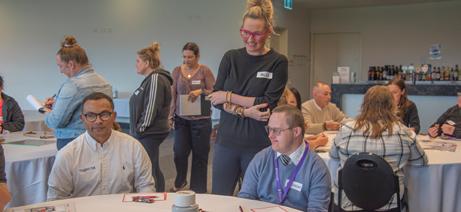 Mjay, Candidate
Mjay, Candidate
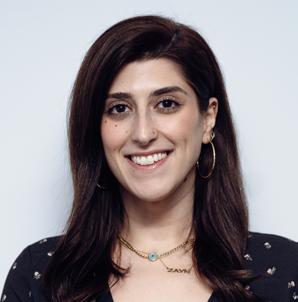
As COO, I have a very personal connection to Assist Ability Australia. I’m one of three children and I have two brothers –Mike and Danny. Danny has Down Syndrome, so we grew up with disability in our household and watched our parents struggle with accessing quality service providers, so it’s wonderful to be a part of a service that provides the best possible care to its participants. Now, 5 years on, Assist Ability is an innovative disability service provider dedicated to empowering people with disabilities to live fulfilling lives.
We are very different in our approach. We hold cooking classes, regular social outings and recently partnered with Upparel, Australia’s largest textile recycler, to launch our Beyond Labels employment program!
People with disabilities deserve the opportunity to learn and have experiences like everyone else does, and that is what we help them do. It has always been our belief that people with disabilities should feel empowered to achieve their full potential and live life on their own terms. Having strong morals, ethics, and purpose, as well as passionate leaders is so important when choosing the right service provider.
Another thing that sets us apart is our commitment to a holistic service offering for our participants and their family. It’s not just about the activities we offer, but also the ability to take care of all transport and logistics involved to make life easier for the participants and their families or caregivers. Even just being able to pick up a participant straight from their house can save the participants and their family members 15-20 minutes of commuting a day. It’s the little things that make all the difference.
We worked with Talentpath on seven different Recruitment Events over a three-month period and ended up hiring close to 60 support workers through the Jobs Victoria and RMIT traineeship program. We were experiencing a shortage of staff, but now we have staff covering all our departments. The project was specifically to recruit support workers to be carers in participants’ homes, respite facilities, and day programs. We ensure new support workers have the chance to experience all the different working environments, so they are well-trained and confident to work across all areas of the business. Being participant-led, it’s all based on the activities and schedule of the participant, so every day is different, but that is what makes it such a rewarding role.
The future of Assist Ability Australia is focusing on its Australiawide expansion with having successfully acquired participants in Queensland this year, our dream is in full motion. We have just launched our first-holiday program in Queensland and look forward to it being a huge success! Eventually, we want to be servicing Australia-wide, and we are on track to do that.
"The Assist Ability Australia Traineeship Project, facilitated by Talentpath, has undeniably contributed to the growth and success of our organisation. The trainees' acquisition of essential skills, knowledge, and experience has greatly enriched our workforce, enabling us to provide even higher-quality support services to those who rely on us. The enthusiasm and dedication demonstrated by the trainees have been nothing short of inspiring, creating a positive ripple effect throughout our entire team. In an era where sourcing capable and passionate individuals for such positions has become increasingly challenging, Talentpath's expertise and commitment have been instrumental in overcoming these obstacles. The injection of fresh talent into our team has invigorated our organisation, allowing us to meet the demands of our community with greater efficiency and effectiveness."
Lola Nicolouleas, Executive Director, Assist Ability
The number one way Accounting & Finance talent like to be rewarded for their work is a salary raise.
Top three factors that would attract Accounting & Finance talent to a new organisation:
Top three factors that contributed to Accounting & Finance talent leaving their previous role:
Your Accounting & Finance talent are not just your number crunchers but overseers of everything within your business. They bring departments together and give people the structure and guidance to perform at their best. Prioritise flexible working locations and hours, a competitive salary and a healthy workplace culture to keep them motivated and driven to succeed.
44% of Accounting & Finance talent expect to change roles in the next 12 months.
29% are currently job hunting
Of that 44% expecting to change roles in the next 12 months, 32% are women and 58% are men.
45%
Over half of Accounting & Finance talent say that flexible hours is their ideal working model.
The most common top three factors that would attract Accounting & Finance talent to a new role:
Men:
Promotion Salary
Women: Job security Flexible working Salary Job security
85% of Accounting & Finance talent strongly agree they feel included, respected and safe to be their authentic self in their workplace.
of Accounting & Finance talent know what their organisation’s values are.
Of those that experienced any of these:
45%
11%
said their employer did not provide any support said the support provided did not meet their expectations
Accounting & Finance talent are happy in their careers, with only 26% considering changing career professions.
*This is the lowest of all divisions
"In the last 12 months, have you experienced any of the below that impacted your ability to perform your best in your role?"
Take us back to the beginning of your career. How did it all start?
I started my career in a small accounting firm in Mount Gravatt. I spent four years there, recording every six minutes of my time on a time sheet, wondering if this was the route for me. I like to give things a red-hot go before I make up my mind, so I moved to a second-tier firm for a year where I completed my Chartered Accounting qualification. I had an idea in my head that I needed to try working in commerce, so I moved into a finance role at an Australian law firm. Over time, this Australian law firm slowly merged with a global firm, then with an American firm. I spent about 13 years there, working my way up from Brisbane Finance Operations Supervisor to National Finance Operations Manager. This is when I really discovered how much I loved managing teams and working on systems and business improvement projects.
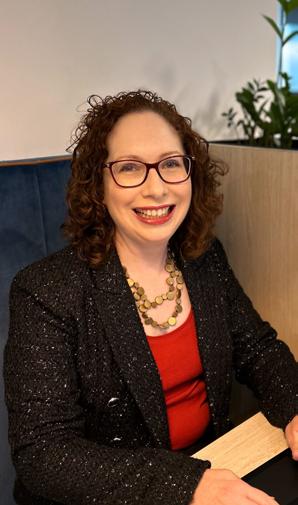
After that, I moved to another law firm and I spent a couple of years there before having two and a half years off to spend some time with my kids while they were young. I came back to work in March this year, initially as a payroll temp at Cornerstone Medical Recruitment and then I was offered the role I have now in a permanent capacity as the Finance Manager at Cornerstone. There's a lot of growth happening here. Within my first couple of weeks of working here, Cornerstone was recognised as one of Australia's Best Places To Work by the Australian Financial Review and I can understand why. I really love Cornerstone Medical Recruitment, the people here are amazing.
What challenges have you faced so far in your career?
Combining a career with young children has definitely been really challenging. One child was not too bad, but throwing another one into the mix was a whole other level. I returned to work after having my son and I was still breastfeeding. I was learning a new role at the same time the COVID pandemic started, and I was leading a team that were completely office based and reliant on paper as well. To top it off we also did a bank refinance in amongst all of that.
One of the things I love here is that it's a really supportive culture. Cornerstone Medical Recruitment provides me with flexibility to do things that I need to do with my kids, and our CEO is a mother of three so she's a strong advocate for parents in the workplace. More than 27% of our team are working parents, so there's a lot of people that just get it.
What would surprise people about your role?
Contrary to the popular belief that finance people just crunch numbers all day, my role is actually all about people; the people that I lead, the teams within Cornerstone whom my team and I support, and the candidates all over Australia that we employ. Our candidates are the frontline healthcare workers in medical facilities across Australia, so it’s really purpose-driven work. At Cornerstone we all work for the common goal of creating great experiences and impacting communities all across Australia. Yes, there is number crunching involved, but I see my job as really being about people.
My piece of advice would be to take every opportunity that presents itself. Don't leave yourself wondering ‘what if’. When I started here, I was in the payroll team and I really hadn't considered this as a career pathway at the time, but I gave it a go. If I wasn’t open to new ideas and taking on different opportunities, I wouldn’t be where I am now.
"It'sachallengingjuggletryingtobethe best mother I can be and the best finance managerIcanbe,butit’stotallyworthit."
I am born and bred Ukrainian – I spent up until my mid-twenties living in Ukraine, pursuing a career in ballet until I met my now husband, Martin. We spent a bit of time exploring Ukraine before we decided to move to the UK for a short stint. My husband is Australian and Europe is a world away from his family, so after sightseeing around the UK we decided to make the move back to Australia.
After touching down in Australia we decided to call the Sunshine Coast home. Moving to a new country and not knowing anyone, you have to start from the bottom again and take opportunities when you can. Just as I found myself in a casual role as a waitress at a local café my husband was diagnosed with a debilitating condition meaning he can’t work and will be reliant on oxygen machines for the rest of his life. Our world turned upside down. There were some major hurdles we had to come to terms with like Martin losing his ability to walk and function without additional support. It forced me to re-evaluate what our life plans were as a couple as well as what I wanted to do in my own life and career. I loved dancing, but I wanted to pursue a career with more financial security for us and our future together.
Starting my career whilst providing for my partner in a foreign country was hard, there’s no other way to put it. I’ve experienced a lot of hardship throughout my life and to this day I continue to care for my husband with his condition, but it hasn’t stopped me from pursuing a fulfilling and rewarding career.
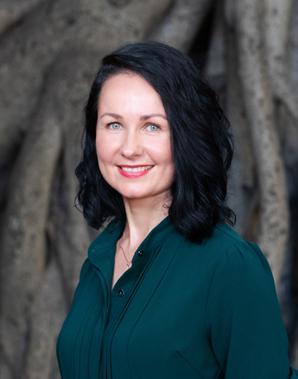
Being thrown into the deep end and learning how to do things myself was a challenge that paid off. I learned how to learn on my own and developed a thick skin. My advice for anyone looking to start a career in accounting is to think about ways to develop your skills in areas other than accounting and always think about how you can grow as a person. Every little thing you learn, small or significant, is important.
How does Ray White support your work-life balance?
My husband and I welcomed a beautiful little girl, Eliana, into the world four years ago through IVF, and Ray White has been nothing but supportive throughout the whole process. I work from home two days a week, but when Eliana was just a baby I was working remotely full-time so I could spend that valuable time with her.
I was always good at math growing up and knew I’d enjoy it, so I enrolled myself in an accounting course at TAFE. I was a good student and attended all my lectures and classes which I now think was incredibly important in helping me land my first accounting role. I had built a good relationship with my tutors, and one day during a tutorial one of my tutors asked if I’d be interested in applying for a role with her company, a Pharmacy group based on the Sunshine Coast. I took that opportunity immediately and started working as an Accounts Payable full-time during the week, studying at night, waitressing on weekends, and tutoring dance classes for children here and there. The opportunity at the Pharmacy Group opened a whole new pathway for me. They offered to pay for my degree on the condition that I stay with the company until completion, but I ended up staying for six years progressing into three different roles. It was a great place to work but after six years I was ready to level up my career in a new organisation. I was looking for a workplace where I could progress further, and that’s when I came across Ray White. We made the move to Brisbane and I started my journey at Ray White as an Assistant Accountant nine years ago, moving into more senior roles before being promoted to my role now - Financial Reporting Manager.
More recently my mother, sister-in-law and her eight-year-old daughter had to find refuge in Australia on a humanitarian visa due to the war in Ukraine and have been living with us since March 2022. Unfortunately, my dad and two brothers are back in Ukraine as men aren’t allowed to leave the country. My family all lost their jobs so I am supporting them as well, which I wouldn’t be able to do if I didn’t have this job. Ray White has been extremely supportive and helped bring my family over when the war started.
Family is so important to me, so I really value working for an organisation like Ray White where they truly care about family and life balance on an individual level.
“RayWhitehasbeenextremelysupportive andhelpedbringmyfamilyoverwhenthe war in Ukraine started.”
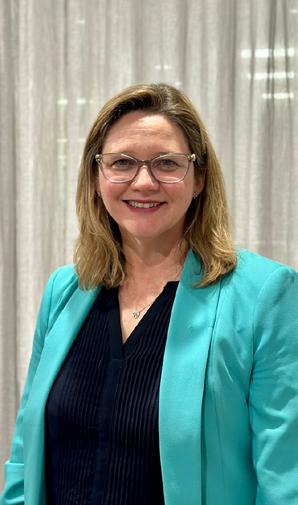
I started my career at PricewaterhouseCoopers in Brisbane in the business services team, before moving into the corporate finance team three years later. That move allowed me to work in the US in San Francisco for two years. Working for a global company meant there were opportunities to travel across the globe, so after living and working in San Francisco I moved to London, then back to Australia to reside in the Sydney office. After almost a decade at PwC, I made the move back to Brisbane and joined the transaction team at Ernst & Young, working within this team for seven years. I had my three children in that time as well, and Ernst & Young provided me with the support I needed to juggle early motherhood and my career.
I had great relationships with all my clients at Ernst & Young and in particular built a really strong rapport with the team at one of my listed clients. After seven years with the transaction team, I moved to my client to head up the Financial Planning and Analysis team. This was my first time moving to a corporate environment from the professional services world, and the existing relationships were key to ensuring it was a smooth transition. It was a busy time and I experienced and implemented a lot during the five years I was there. Towards the end of my time there, the company decided to move their head office to Melbourne. I wanted to stay in Brisbane, and was given an opportunity to join a boutique corporate finance and growth consulting firm. It was a great company, but after working in a commercial role the previous five years I realised that I was more suited to commercial life than consulting. I was fortunate to be offered an opportunity to join Affinity Education. Affinity Education operates 227 childcare centres across the country under several different entities. I’m the Chief Financial Officer and Company Secretary and have worked in this role for over four years now. I’ve always enjoyed accounting and problem-solving - it’s something I clicked with from a young age. I feel very lucky to be able to do something I enjoy at an amazing workplace like Affinity Education.
It’s more operational than people realise. I work very closely with our small executive team and the operations teams as well as my teams every day. Yes, the core of the role is certainly anchored in optimising the financial results, but that requires fully appreciating the impacts of all parts of the business. You need to understand how each area of the business works to truly drive company value.
Over the years I have appreciated the value in having the ability to listen and be humble. No matter how much experience you have, as soon as you start a new role in a new organisation, you’re starting from scratch again. You have to be humble, listen and learn until you gain a true understanding of the business and role – then you can start to make your mark.
Another thing I have learned to be is the person who gets stuff done. I absolutely ensure I maintain a focus on quality and accuracy, but at the end of the day what is most useful to an organisation is the ability to take a problem, make good decisions, achieve an outcome, meet your deadlines, and get stuff done. That problem-solving and getting-things-done mentality has been incredibly useful in my career.
What is your proudest career achievement so far?
I'm proud of my whole career and where I am right now in my journey. This role brings together all the experiences I have accumulated along the way and allows me to use those experiences to add value across the whole company. Perhaps my proudest moments are when my daughters accidently let slip that they are proud of me and what I have achieved in my career. Nothing really beats that.
“Thatproblem-solvingandgetting-thingsdonementalityhasbeenincrediblyusefulin mycareer.”
49%
of Projects & Change talent have undertaken study in the last 12 months to further develop their skills and career
Projects & Change talent are your high-level thinkers that take the lead when it comes to project management and organisational change. They are wired to find solutions, overcome problems and innovate processes and procedures to improve productivity in your organisation. Ensure you offer a competitive salary, strong motivational drivers, flexible working locations and professional development program to get the best out of your Projects & Change talent.
51% of Projects & Change talent expect to change roles in the next year, with 20% currently job hunting.
"In the last 12 months, have you experienced any of the below that impacted your ability to perform your best in your role?"
81% men agree vs 69% of women
16% 33%
60% of Projects & Change talent have asked their current employer for a salary increase and/or looked for a new role with a higher salary due to the rising cost of living.
Projects & Change are most likely to experience lack of motivation when compared to other divisions.
45% of those experiencing the above did not receive employer support
of Projects & Change talent say verbal one on one recognition is the number one way they like to be rewarded.
Men are more likely to feel that the support provided exceeded their expectations compared to women.
of Projects & Change talent left their last role due to their mental health.
Top three factors that would attract Projects & Change talent to a new role:
Top three factors that would attract Projects & Change talent to a new organisation:
Top three reasons Projects & Change talent left their last role:
"My workplace is inclusive and respectful of people from different cultures, backgrounds and abilities"
Top three benefits that Projects & Change respondents say are more important than salary:
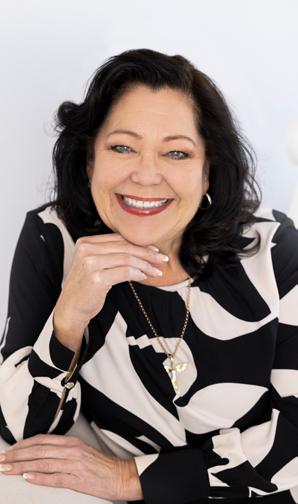
I’m a Project Manager at the Department of Resources since August 2022. I work in the GeoResources Information Intelligence Division, and I’m running four different projects for them at the moment.
I started off my career wanting to be an accountant! That didn’t stick for very long, but the finance side pushed me in the direction of payroll, so I started developing payrolls for a Bureau in South Africa.
Being in payroll opened opportunities for me and I ended up being poached to move into an HR Manager and Payroll hybrid role with a large chemical company. There were a lot of political changes happening in South Africa, and I did a lot of reporting for this company which turned into developing payroll data into an HR system. We then implemented this system across 19 different branches within the business, and that’s where my project management experience started. I moved over to the Vendor client services team to manage and continue to develop this HR system. From here I continued to work in the HRIS and Payroll space for an American company breaking into the South African market bringing in integrated databases for both HR and Payroll. This role took me all over Africa where I moved into a Marketing and Pre-Sales position, presenting and selling the integrated HR/Payroll system which I had assisted in preparing for the South African Market.
Fast forward a few years and I progressed to Marketing Director at AXS-One. My sister lived in Australia and we were visiting her and Australia for the first time. While this was a personal trip, I had a glimpse into the work-life balance, It’s incredible here. I was used to the workaholic lifestyle, I loved the lifestyle and decided that Australia was where my children and I needed to be.
I transferred to the Australian branch of the organisation I was with in South Africa where they helped me secure permanent residency. Shortly afterwards I decided to go on my own, and that was when I started my professional project management career. I’ve been consulting for the last 20 years, and every project I do is different. It’s so challenging and rewarding.
What hurdles have you faced in your career?
It’s been hard as a woman.
Honestly, it’s been really hard. I climbed the corporate ladder quickly - I was an HR manager by the time I was 30 and an Executive Director by the time I was 40. Let me tell you, I was usually the only woman in the room in an executive meeting
and constantly “looked on” as being the tea pourer. That never happened! It was just so much harder to get your point across, to make them believe in what you were saying.
I must say the culture is completely different here in Brisbane. The Department of Resources has the best culture in any public government organisation I have ever worked for. I’m really feeling very supported here.
It’s not work-related, but I’m very proud of the fact that I immigrated 21 years ago with my family as a single parent. I managed to get both my kids through private schools. When Candice arrived in Australia, she went to university as an international student, which cost an absolute fortune. But I did it. And my children are just so grateful.
The biggest piece of advice that I can give anybody going into project management is you do not know everything. You need your team around you. You mentor people and you guide people to make the right decision, but you never make a business decision on their behalf. Next bit of advice is to never surprise your Project Board or Steering Committee. Lobby new ideas individually for support before presenting surprises or changes.
"Ineverdothesamethingtwice,andIlove thataboutprojectmanagement."
I didn’t start out pursuing a career in change management. In fact, I attended university to become a secondary school music teacher; a world away from what I do now. I’ve always played & loved music so I thought that would be the career for me, until I realised I wanted to keep my career and my hobbies separate.
After some overseas travel I made the move to work in banking for various banks in New Zealand before landing my first leadership role – National IT Help Desk Manager. This role was my first exposure to the world of IT & I really loved it, so much so that I was inspired to undertake my MBA specialising in organisational change and strategic IT.
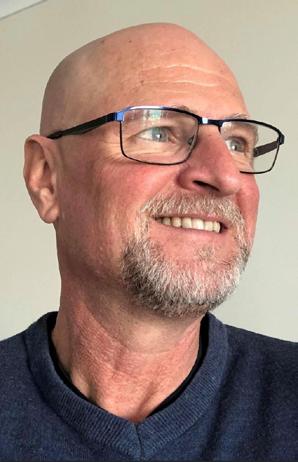
Gaining my MBA gave me the confidence and knowledge to start my own consulting business, which I ran for six years, consulting to organisations to improve customer service in the IT environment. I was working closely with help desks and contact centres in New Zealand before moving to Australia in 2001, to focus on service delivery improvement project management. Customer service is very much about connecting with people and building relationships, and that is something you don’t do as much in an 100% IT role. My consulting background meant I could enjoy the best of both worlds, so I really suited the people focus required in organisational change management.
I’ve been fortunate enough to complete change management work for organisations such as Brisbane City Council, NAB, Origin Energy, City of Gold Coast and Urban Utilities. My last two years have been at Allianz Partners where I worked in projects across both IT and business improvement, as well as raising change management maturity within the organisation. I’m now working for Senex Energy within their digital transformation change management team.
One of the best things to do is jump onto the Change Management Institute website and take a look at the resources about change management. It’s a global volunteer organisation that’s both supporting & promoting change management as a profession. I’ve been a CMI members for over 15 years and, as change managers often work alone, I love the energy of CMI networking get togethers & professional development sessions.
Another tip or an approach I use in my change management practices has always been to start with the end in mind. For example, if you work backwards from a timeframe like six or twelve months into the future, you need to foresee how something you are implementing will be received. Ask questions like, ‘will people talk about how this improves their day-to-day?’, or ‘will this new system improve how employees are talking to customers compared to six months ago?'
When you have kids, a lot of your personal life is consumed by raising them and spending valuable time together. But as the kids grow up and they start creating their own lives, you’re left with more spare time to fill, and sometimes that spare time ends up being consumed by work. It’s easy to do but it’s not good for you. Just like you manage your work calendar with meetings and to-do lists, you need to schedule in time to unwind in your private life as well. It takes discipline to not work all the time, and that’s why I have hobbies such as playing guitar and going to concerts to relax and fill up my spare time. I also volunteer time with the Change Management Institute, and I’m involved in mentoring there too.
Gaining get buy-in from people who have been in an organisation for years, and ones that have just joined, to adapt and adopt to new systems and processes. It’s that challenge that I enjoy, and that’s why I keep doing it. I’m continuously learning about and meeting new people and affecting impactful change with consideration of people at the centre of things.
My career has evolved around people, from customer service to change management, but it’s absolutely not been a considered or planned career. There’s been variety across industries, business outcomes and technologies, and I embrace that variety.
"Forme,changemanagementisallabout people;creatingbusinessreadinessthrough engagement."
I grew up in a small town on the New South Wales mid-north coast and as soon as I finished school, I moved to Sydney. I started looking for an entry-level job to break into the workforce and found a role as a receptionist and accounts receivable clerk before moving up to Brisbane two years later.
In Brisbane I started working as an assistant paralegal for a property conveyancer (who sponsored my study to complete a Diploma in Business Administration & Management) before making the transition into the banking industry, starting in property settlements as a settlements clerk, which led me to assisting in property lending, before landing my first operational role with ANZ Corporate Finance. I was with ANZ for 12 years, taking on more and more responsibility and more operational and project management responsibilities to eventually become a fully-fledged project manager, completing a formal Project Management Professional (PMP) qualification which I was able to ‘fast-track’, given my years of recognised prior learning on the job.
My favourite role with ANZ was as National Operations Manager for the property development finance team. I loved my responsibilities, my team and my manager. Unfortunately, ANZ soon underwent a restructure and I put together a business case for why I should receive a redundancy, which allowed me to have a break.
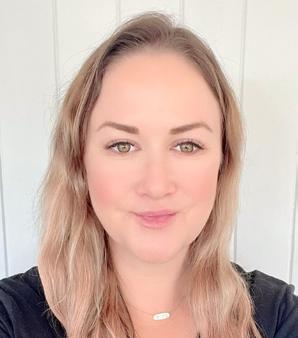
I had planned to have only a few months off until unfortunately, the COVID pandemic happened, which made finding a new role very difficult. To make matters far worse, my best friend suddenly passed away. Those few months of planned rest turned into an almost 18-month career break for me. That wasn’t what I wanted or intended, but it ended up being a blessing in disguise as I needed that time to process everything that had happened and to properly grieve. When I returned to the job market I wanted to be proud of where I was working and what I was doing, knowing I was making an impact to help others. Losing someone so close to you is a massive life change and makes you reassess absolutely everything!
Eventually I came across an opening for a Business Services Manager at Palladium International (a ‘positive Impact’ international consultancy business that manages programs for the Australian Government, to effect positive change) and saw that it lined up well with my experience and values. The role also included interesting responsibilities such as managing the operations of all the Asia Pacific Offices.
In addition to the Business Services Manager role, I also took on added responsibilities such as Sustainable Business Lead, Travel Director and APAC Communications Lead, alongside the management of the IT and administration staff. After almost two years in this corporate managed role, I was asked to join one of the flagship programs of Palladium, the Humanitarian Logistics Capability, as Project Manager - a new challenge that I welcomed! I am now the Program and Operations Manager for
the HLC program, a pivotal, ‘whole program’ role that oversees active response operations, project management and execution, governance, business development, and technical project delivery My role is rewarding, unpredictable, yet highly impactful, and I am now very proud to tell people where I work and what I help to achieve, to help others.
Although I wasn’t on the front line, being able to support the Australian Government’s response to the Türkiye earthquake disaster has to be one of my proudest achievements to date. That was very much a baptism by fire, as it was the first emergency response that I had played such a big part in.
The Australian Government deployed search and rescue workers from NSW, ACT, and QLD state agencies, as well as three Australian Government liaison officers to Türkiye to help Türkiye’s locally led response and early recovery efforts. This was also strengthened with the deployment of two HLC team members to Türkiye to provide logistical support to Team Australia. Being the logistics and operational contact back in Australia for our deployment team in Türkiye was a very important role to ensure they had sufficient fuel, access to vehicles, and secure communications, like satellite phones. It’s all those little moving parts that need to work together in such an urgent situation. I worked very long hours on that response, at all times of the day and night, and I am very proud of the support the HLC team was able to provide to the Australian Government and the people of Türkiye.
Don’t be afraid of feeling like you don’t know everything. Don’t ever say no to a job or an opportunity because you don’t feel like you’re ready. I think so much of the learning is done on the job, and for me, it’s transferable skills, the ability to connect with and learn from people and the willingness to put in the work which have always opened unexpected and exciting career doors.
